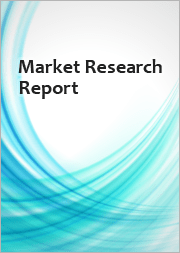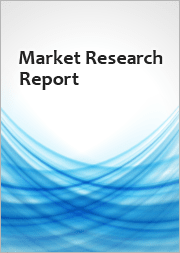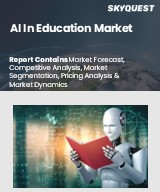
|
시장보고서
상품코드
1865395
신경 다양성 대응 EdTech 시장 예측(-2032년) : 제품별, 배포 방식별, 교육 레벨별, 신경 다양성 유형별, 기술별, 최종사용자별, 지역별 분석Neuro-Divergent Focused EdTech Market Forecasts to 2032 - Global Analysis By Product, Deployment Model, Education Level, Neurodivergence Type, Technology, End User, and By Geography |
||||||
Stratistics MRC의 조사에 따르면 세계의 신경 다양성 대응 EdTech 시장은 2025년에 24억 달러 규모로 추산 되며, 2032년까지 64억 달러에 달할 것으로 예측됩니다. 예측 기간 중 CAGR은 15.1%로 전망되고 있습니다. 신경 다양성 대응 EdTech란 자폐증, ADHD, 난독증, 기타 신경발달장애 등 인지적 차이를 가진 학습자를 지원하기 위해 특별히 고안된 교육 기술입니다. 이러한 플랫폼은 적응형 학습, 감각을 고려한 인터페이스, 개인화된 컨텐츠 전달을 통해 다양한 학습 스타일과 요구를 충족시킬 수 있습니다. AI, 행동분석, 인클루시브 디자인 원칙을 활용하여 학습자의 참여도, 이해도, 학업성취도 향상을 목표로 하고 있습니다. 이 분야는 K-12 교육, 고등교육, 직업훈련의 모든 환경에서 공평한 교육을 촉진하고 포용적인 환경을 구축하는 데 중요한 역할을 하고 있습니다.
Gitnux에 따르면 미국내 자폐증 성인의 85%가 실직 또는 불완전 고용 상태인 것으로 알려져 개별화된 교육 플랫폼의 필요성이 대두되고 있습니다.
세계에서 신경다양성에 대한 인식과 진단 증가
진단율의 향상과 지원 활동의 확대에 따라 교육기관은 포용적 학습 환경의 구축을 점점 더 우선순위에 두고 있습니다. 이러한 인식 증가는 재정 지원 증가, 정책적 지원, 신경다양성 학습자를 고려한 커리큘럼의 적응으로 이어지고 있습니다. 또한 학부모와 교육자들은 다양한 인지 프로파일에 대응할 수 있는 툴을 적극적으로 찾고 있으며, 이는 시장 보급을 가속화하고 있습니다. 이러한 추세는 공교육과 사교육 양 분야에서 장기적인 성장을 지속할 것으로 예측됩니다.
전문적인 적응형 학습 기술의 높은 개발 비용
신경다양성 사용자를 위한 맞춤형 적응형 학습 플랫폼 개발에는 연구개발, 사용자 경험 맞춤화, 접근성 준수에 대한 막대한 투자가 수반됩니다. 이러한 기술은 엄격한 테스트, 행동 분석의 통합, 임상 전문가와의 협력이 필요하며, 생산 비용을 증가시킵니다. 또한 다국어 지원과 문화적으로 배려한 인터페이스의 필요성이 확장성을 더욱 복잡하게 만들고 있습니다. 소규모 에듀테크 기업은 한정된 자본과 규제 장벽으로 인해 진입장벽에 직면하는 경우가 많습니다.
기업 교육 및 직장 지원 툴로 확대
조직에서는 신경 다양성을 가진 직원들을 지원하기 위해 포용적 교육 모듈과 생산성 향상 툴의 도입이 확대되고 있습니다. 이러한 움직임은 보다 광범위한 DEI(다양성, 공정성, 포용성) 구상 및 직장 환경 개선에 대한 법적 의무와도 일치합니다. 또한 인지적 유연성, 작업 관리, 감각을 고려한 인터페이스를 제공하는 플랫폼이 인사(HR) 및 인재개발(L&D) 시스템에 통합되고 있습니다. 전문성 개발 및 인력 지원 분야로의 진출은 EdTech 프로바이더가 서비스를 다양화하고 기업 예산을 확보할 수 있는 유망한 기회가 될 수 있습니다.
민감한 학생 정보 관련 데이터 프라이버시 문제
GDPR(EU 개인정보보호규정) 및 COPPA와 같은 규제 프레임워크는 엄격한 컴플라이언스 요건을 부과하고 있으며, 위반시 평판 손상 및 법적 처벌을 받을 수 있습니다. 또한 학부모와 교육기관은 클라우드 기반 스토리지 및 타사 통합에 대해 신중한 태도를 유지하고 있습니다. 플랫폼의 개인화가 진행됨에 따라 안전한 데이터 처리와 투명한 동의 메커니즘을 확보하는 것이 매우 중요합니다. 이러한 우려는 특히 엄격한 데이터 보호법이 존재하는 지역에서는 도입률 저해 및 교육기관과의 제휴 지연으로 이어질 수 있습니다.
COVID19의 영향:
COVID-19 팬데믹은 교육 분야의 디지털 전환을 가속화하고 원격 학습 툴의 보급을 촉진했습니다. 신경다양성을 가진 학생들에게는 이러한 변화가 과제와 기회를 동시에 가져다주었습니다. 유연하고 집중하기 쉬운 환경의 혜택을 받은 학생들이 있는 반면, 사회적 교류의 감소와 불균등한 지원체계로 인해 어려움을 겪는 학생들도 있었습니다. EdTech 프로바이더들은 접근성 기능을 강화하거나 개별 요구에 맞는 비동기식 모듈을 제공하는 방식으로 대응했습니다. 또한 종합적인 디지털 교육에 대한 자금 지원이 전 세계에서 증가했습니다.
예측 기간 중 개인화된 적응형 학습 플랫폼 부문이 가장 큰 시장 규모를 차지할 것으로 예측됩니다.
예측 기간 중 개인화된 적응형 학습 플랫폼 부문이 가장 큰 시장 점유율을 차지할 것으로 예측됩니다. 이는 개인별 인지 프로파일과 학습 행동에 따라 컨텐츠 전달을 맞춤화할 수 있는 능력에 기인합니다. 이러한 플랫폼은 AI 기반 분석과 실시간 피드백을 활용하여 속도, 형식, 복잡성을 조정하므로 특히 신경다양성을 가진 학습자에게 효과적입니다. 또한 교육기관에서는 학습 의욕과 성과 향상을 위해 이러한 툴의 도입이 활발히 이루어지고 있습니다. 연령대와 교육 환경에 구애받지 않는 범용성과 함께 신경다양성을 위한 에듀테크 환경에서의 우위를 더욱 확고히 하고 있습니다.
예측 기간 중 클라우드(SaaS) 부문이 가장 높은 CAGR을 보일 것으로 예측됩니다.
예측 기간 중 클라우드(SaaS) 부문은 확장성, 비용 효율성, 다양한 교육 환경에서의 도입 용이성으로 인해 가장 높은 성장률을 보일 것으로 예측됩니다. SaaS 플랫폼은 실시간 업데이트, 원격 접속, 기존 LMS 시스템과의 원활한 연동을 가능하게 하며, 이는 신경다양성 학습자를 지원하는 데 있으며, 매우 중요합니다. 또한 클라우드 기반 솔루션은 데이터베이스의 개별화 학습과 공동 학습 경험을 촉진합니다. 교육기관이 유연한 인프라와 원격 액세스를 우선시하는 가운데, SaaS 모델은 기존 소프트웨어 형식을 능가하는 도입률과 혁신성을 보일 것으로 예측됩니다.
가장 큰 점유율을 차지하는 지역:
예측 기간 중 북미는 강력한 기관 지원, 첨단 디지털 인프라, 진보적인 신경 다양성 정책에 힘입어 가장 큰 시장 점유율을 유지할 것으로 예측됩니다. 미국과 캐나다에서는 공공 자금과 민간 부문의 노력으로 포용적 교육 및 교육 기술(EdTech) 혁신에 많은 투자가 이루어지고 있습니다. 또한 주요 EdTech 기업 및 학술연구센터의 존재는 지속적인 제품 개발을 촉진하고 있습니다. 교육자 및 학부모들 사이에서 높은 인지도 또한 북미를 주요 지역 시장으로 자리매김하는 데 기여하고 있습니다.
가장 높은 CAGR이 예상되는 지역:
예측 기간 중 아시아태평양은 디지털 문해력 향상, 인터넷 보급률 확대, 포용적 교육에 대한 지지 확대로 인해 가장 높은 CAGR을 보일 것으로 예측됩니다. 인도, 중국, 인도네시아 등의 국가들은 신경다양성 학습자를 지원하는 에듀테크 인프라와 정책 개혁에 투자하고 있습니다. 또한 이 지역의 방대한 학생 인구와 저렴한 가격의 확장 가능한 솔루션에 대한 수요 증가는 혁신의 비옥한 토양을 형성하고 있습니다. 국내 스타트업 기업 및 세계 기업이 적극적으로 시장에 진입하고 있으며, 신경다양성 대응 EdTech 제품/서비스의 빠른 성장과 다양화에 기여하고 있습니다.
무료 커스터마이징 서비스
이 보고서를 구독하는 고객은 다음과 같은 무료 맞춤화 옵션 중 하나를 이용할 수 있습니다.
- 기업 소개
- 추가 기업 종합 프로파일링(최대 3사)
- 주요 기업의 SWOT 분석(최대 3사)
- 지역 구분
- 고객의 관심에 따른 주요 국가별 시장 추정, 예측, CAGR(주: 타당성 확인에 따라 다름)
- 경쟁사 벤치마킹
- 제품 포트폴리오, 지역적 입지, 전략적 제휴를 기반으로 한 주요 기업 벤치마킹
목차
제1장 개요
제2장 서론
- 개요
- 이해관계자
- 분석 범위
- 분석 방법
- 데이터 마이닝
- 데이터 분석
- 데이터 검증
- 분석 어프로치
- 분석 자료
- 1차 조사 자료
- 2차 조사 자료
- 전제조건
제3장 시장 동향 분석
- 서론
- 촉진요인
- 억제요인
- 시장 기회
- 위협
- 제품 분석
- 기술 분석
- 최종사용자 분석
- 신흥 시장
- 신형 코로나바이러스(COVID-19)의 영향
제4장 Porters Five Force 분석
- 공급업체의 교섭력
- 바이어의 교섭력
- 대체 제품의 위협
- 신규 참여 기업의 위협
- 기업간 경쟁
제5장 세계의 신경 다양성 대응 EdTech 시장 : 제품별
- 서론
- 평가 및 스크리닝 툴
- 맞춤형 적응형 학습 플랫폼
- 지원 기술과 접근성 툴
- 시행 기능 지원
- 사회 스킬과 커뮤니케이션 지원
- 감각 조절과 운동 지원
- 내용과 커리큘럼
- 교사/전문가 개발 및 코칭 플랫폼
제6장 세계의 신경 다양성 대응 EdTech 시장 : 배포 방식별
- 서론
- 클라우드(SaaS)
- 온프레미스
제7장 세계의 신경 다양성 대응 EdTech 시장 : 교육 레벨별
- 서론
- 유소기
- 초등교육
- 중등 학교·고등학교
- 고등교육 기관/성인 학습자
제8장 세계의 신경 다양성 대응 EdTech 시장 : 신경 다양성 유형별
- 서론
- 자폐 스펙트럼 장애
- ADHD/주의력의 차이
- 난독증 및 특정 학습 장애
- 난산증(Dyscalculia)
제9장 세계의 신경 다양성 대응 EdTech 시장 : 기술별
- 서론
- 인공지능과 ML
- 적응형 학습 엔진 및 분석
- AR/VR과 몰입형 체험
- 모바일 및 웹 앱, 클라우드 SaaS
- 웨어러블과 센서
제10장 세계의 신경 다양성 대응 EdTech 시장 : 최종사용자별
- 서론
- 학교(공립·사립)
- 특별 지원 교육 센터와 클리닉
- 부모와 D2C(직접 소비자) 바이어
- 고등교육과 직업 훈련
- 고용주와 직장 학습
제11장 세계의 신경 다양성 대응 EdTech 시장 : 지역별
- 서론
- 북미
- 미국
- 캐나다
- 멕시코
- 유럽
- 독일
- 영국
- 이탈리아
- 프랑스
- 스페인
- 기타 유럽
- 아시아태평양
- 일본
- 중국
- 인도
- 호주
- 뉴질랜드
- 한국
- 기타 아시아태평양
- 남미
- 아르헨티나
- 브라질
- 칠레
- 기타 남미
- 중동 및 아프리카
- 사우디아라비아
- 아랍에미리트
- 카타르
- 남아프리카공화국
- 기타 중동 및 아프리카
제12장 주요 동향
- 계약, 사업 제휴·협력, 합병사업
- 기업인수합병(M&A)
- 신제품 발매
- 사업 확장
- 기타 주요 전략
제13장 기업 프로파일링
- Cognassist
- Brain in Hand Ltd
- Floreo Inc.
- Tobii Dynavox
- Avaz Inc.
- Gemiini Systems
- ModMath
- PRC-Saltillo
- AssistiveWare
- PresenceLearning
- Learning Ally
- Texthelp
- Lexia Learning
- Kurzweil Education
- Claro Software Ltd
- CogniFit
- Speechify
- Mursion
According to Stratistics MRC, the Global Neuro-Divergent Focused EdTech Market is accounted for $2.4 billion in 2025 and is expected to reach $6.4 billion by 2032, growing at a CAGR of 15.1% during the forecast period. Neuro-divergent focused EdTech are educational technologies specifically designed to support learners with cognitive differences such as autism, ADHD, dyslexia, and other neurodevelopmental conditions. These platforms incorporate adaptive learning, sensory-friendly interfaces, and personalized content delivery to accommodate diverse learning styles and needs. By leveraging AI, behavioral analytics, and inclusive design principles, they aim to improve engagement, comprehension, and academic outcomes. This segment plays a critical role in promoting equitable education and fostering inclusive environments across K-12, higher education, and professional training settings.
According to Gitnux, 85% of autistic adults in the U.S. are unemployed or underemployed, highlighting the need for tailored educational platforms.
Market Dynamics:
Driver:
Rising global awareness and diagnosis of neurodiversity
As diagnostic rates improve and advocacy efforts expand, institutions are increasingly prioritizing inclusive learning environments. This heightened awareness has led to increased funding, policy support, and curriculum adaptations that favor neurodivergent learners. Moreover, parents and educators are actively seeking tools that accommodate diverse cognitive profiles, thereby accelerating market adoption. This trend is expected to sustain long-term growth across both public and private education sectors.
Restraint:
High development costs for specialized adaptive learning technologies
The development of adaptive learning platforms tailored for neurodivergent users involves substantial investment in R&D, UX customization, and accessibility compliance. These technologies require rigorous testing, integration of behavioral analytics, and collaboration with clinical experts, which elevates production costs. Additionally, the need for multilingual and culturally sensitive interfaces further complicates scalability. Smaller EdTech firms often face barriers to entry due to limited capital and regulatory hurdles.
Opportunity:
Expansion into corporate training and workplace support tools
Organizations are increasingly adopting inclusive training modules and productivity tools to support neurodivergent employees. This shift aligns with broader DEI (Diversity, Equity, and Inclusion) initiatives and legal mandates for workplace accommodations. Furthermore, platforms offering cognitive flexibility, task management, and sensory-friendly interfaces are being integrated into HR and L&D systems. The expansion into professional development and workforce enablement presents a lucrative opportunity for EdTech providers to diversify offerings and tap into enterprise budgets.
Threat:
Data privacy concerns regarding sensitive student information
Regulatory frameworks like GDPR and COPPA impose strict compliance requirements, and any breach can result in reputational damage and legal penalties. Moreover, parents and institutions remain cautious about cloud-based storage and third-party integrations. As platforms become more personalized, ensuring secure data handling and transparent consent mechanisms becomes critical. These concerns may hinder adoption rates and delay institutional partnerships, especially in regions with stringent data laws.
Covid-19 Impact:
The Covid-19 pandemic accelerated digital transformation in education, prompting widespread adoption of remote learning tools. For neurodivergent students, this shift highlighted both challenges and opportunities. While some benefited from flexible, distraction-free environments, others struggled with reduced social interaction and inconsistent support. EdTech providers responded by enhancing accessibility features and offering asynchronous modules tailored to individual needs. Additionally, funding for inclusive digital education increased globally.
The personalized adaptive learning platforms segment is expected to be the largest during the forecast period
The personalized adaptive learning platforms segment is expected to account for the largest market share during the forecast period due to its ability to tailor content delivery based on individual cognitive profiles and learning behaviors. These platforms leverage AI-driven analytics and real-time feedback to adjust pacing, format, and complexity, making them particularly effective for neurodivergent learners. Moreover, institutions are increasingly adopting these tools to improve engagement and outcomes. Their versatility across age groups and educational settings further contributes to their dominance in the neurodivergent EdTech landscape.
The cloud (SaaS) segment is expected to have the highest CAGR during the forecast period
Over the forecast period, the cloud (SaaS) segment is predicted to witness the highest growth rate owing to its scalability, cost-efficiency, and ease of deployment across diverse educational environments. SaaS platforms enable real-time updates, remote access, and seamless integration with existing LMS systems, which are critical for supporting neurodivergent learners. Additionally, cloud-based solutions facilitate data-driven personalization and collaborative learning experiences. As institutions prioritize flexible infrastructure and remote accessibility, SaaS models are expected to outperform traditional software formats in terms of adoption and innovation.
Region with largest share:
During the forecast period, the North America region is expected to hold the largest market share driven by strong institutional support, advanced digital infrastructure, and progressive neurodiversity policies. The U.S. and Canada have witnessed significant investments in inclusive education and EdTech innovation, supported by both public funding and private sector initiatives. Moreover, the presence of leading EdTech firms and academic research centers fosters continuous product development. High awareness levels among educators and parents further contribute to robust adoption, positioning North America as the dominant regional market.
Region with highest CAGR:
Over the forecast period, the Asia Pacific region is anticipated to exhibit the highest CAGR due to rising digital literacy, expanding internet penetration, and growing advocacy for inclusive education. Countries like India, China, and Indonesia are investing in EdTech infrastructure and policy reforms that support neurodivergent learners. Furthermore, the region's large student population and increasing demand for affordable, scalable solutions create fertile ground for innovation. Local startups and global players are actively entering the market, contributing to rapid growth and diversification of neurodivergent-focused EdTech offerings.
Key players in the market
Some of the key players in Neuro-Divergent Focused EdTech Market include Cognassist, Brain in Hand Ltd, Floreo Inc., Tobii Dynavox, Avaz Inc., Gemiini Systems, ModMath, PRC-Saltillo, AssistiveWare, PresenceLearning, Learning Ally, Texthelp, Lexia Learning, Kurzweil Education, Claro Software Ltd, CogniFit, Speechify, and Mursion.
Key Developments:
In May 2024, PresenceLearning announced its partnership with the National University Scholars Society to provide its teletherapy services, including speech and behavioral therapy, to support neurodivergent students.
In May 2024, Tobii Dynavox announced the launch of the Tobii Dynavox I-Series(TM), a new generation of speech-generating devices with enhanced processing power, a slimmer design, and updated Snap + Core First software for AAC users.
In October 2023, AssistiveWare launched a major update to its Proloquo2Go and Proloquo4Text apps with a new feature called "Word Vibes," using color and animation to support language and literacy development for AAC users.
In October 2023, PRC-Saltillo announced the release of the Nuvo(TM) Connect, a feature that allows for remote therapy, coaching, and support for users of their Nuvo speech-generating devices.
Product Covered:
- Assessment & screening tools
- Personalized adaptive learning platforms
- Assistive technology & accessibility tools
- Executive-function supports
- Social-skills & communication supports
- Sensory modulation & motor supports
- Content & curriculum
- Teacher/professional development & coaching platforms
Deployment Models Covered:
- Cloud (SaaS)
- On-premises
Education Levels Covered:
- Early childhood
- Primary / elementary
- Secondary / middle & high school
- Post-secondary / adult learners
Neurodivergence Types Covered:
- Autism spectrum
- ADHD / attention differences
- Dyslexia & specific learning disorders
- Dyscalculia
Technologies Covered:
- Artificial intelligence & ML
- Adaptive learning engines & analytics
- AR/VR & immersive experiences
- Mobile & web apps, cloud SaaS
- Wearables & sensors
End Users Covered:
- Schools (public / private)
- Special education centers & clinics
- Parents & direct-to-consumer (D2C) buyers
- Higher education & vocational training
- Employers & workplace learning
Regions Covered:
- North America
- US
- Canada
- Mexico
- Europe
- Germany
- UK
- Italy
- France
- Spain
- Rest of Europe
- Asia Pacific
- Japan
- China
- India
- Australia
- New Zealand
- South Korea
- Rest of Asia Pacific
- South America
- Argentina
- Brazil
- Chile
- Rest of South America
- Middle East & Africa
- Saudi Arabia
- UAE
- Qatar
- South Africa
- Rest of Middle East & Africa
What our report offers:
- Market share assessments for the regional and country-level segments
- Strategic recommendations for the new entrants
- Covers Market data for the years 2024, 2025, 2026, 2028, and 2032
- Market Trends (Drivers, Constraints, Opportunities, Threats, Challenges, Investment Opportunities, and recommendations)
- Strategic recommendations in key business segments based on the market estimations
- Competitive landscaping mapping the key common trends
- Company profiling with detailed strategies, financials, and recent developments
- Supply chain trends mapping the latest technological advancements
Free Customization Offerings:
All the customers of this report will be entitled to receive one of the following free customization options:
- Company Profiling
- Comprehensive profiling of additional market players (up to 3)
- SWOT Analysis of key players (up to 3)
- Regional Segmentation
- Market estimations, Forecasts and CAGR of any prominent country as per the client's interest (Note: Depends on feasibility check)
- Competitive Benchmarking
- Benchmarking of key players based on product portfolio, geographical presence, and strategic alliances
Table of Contents
1 Executive Summary
2 Preface
- 2.1 Abstract
- 2.2 Stake Holders
- 2.3 Research Scope
- 2.4 Research Methodology
- 2.4.1 Data Mining
- 2.4.2 Data Analysis
- 2.4.3 Data Validation
- 2.4.4 Research Approach
- 2.5 Research Sources
- 2.5.1 Primary Research Sources
- 2.5.2 Secondary Research Sources
- 2.5.3 Assumptions
3 Market Trend Analysis
- 3.1 Introduction
- 3.2 Drivers
- 3.3 Restraints
- 3.4 Opportunities
- 3.5 Threats
- 3.6 Product Analysis
- 3.7 Technology Analysis
- 3.8 End User Analysis
- 3.9 Emerging Markets
- 3.10 Impact of Covid-19
4 Porters Five Force Analysis
- 4.1 Bargaining power of suppliers
- 4.2 Bargaining power of buyers
- 4.3 Threat of substitutes
- 4.4 Threat of new entrants
- 4.5 Competitive rivalry
5 Global Neuro-Divergent Focused EdTech Market, By Product
- 5.1 Introduction
- 5.2 Assessment & screening tools
- 5.3 Personalized adaptive learning platforms
- 5.4 Assistive technology & accessibility tools
- 5.5 Executive-function supports
- 5.6 Social-skills & communication supports
- 5.7 Sensory modulation & motor supports
- 5.8 Content & curriculum
- 5.9 Teacher/professional development & coaching platforms
6 Global Neuro-Divergent Focused EdTech Market, By Deployment Model
- 6.1 Introduction
- 6.2 Cloud (SaaS)
- 6.3 On-premises
7 Global Neuro-Divergent Focused EdTech Market, By Education Level
- 7.1 Introduction
- 7.2 Early childhood
- 7.3 Primary / elementary
- 7.4 Secondary / middle & high school
- 7.5 Post-secondary / adult learners
8 Global Neuro-Divergent Focused EdTech Market, By Neurodivergence Type
- 8.1 Introduction
- 8.2 Autism spectrum
- 8.3 ADHD / attention differences
- 8.4 Dyslexia & specific learning disorders
- 8.5 Dyscalculia
9 Global Neuro-Divergent Focused EdTech Market, By Technology
- 9.1 Introduction
- 9.2 Artificial intelligence & ML
- 9.3 Adaptive learning engines & analytics
- 9.4 AR/VR & immersive experiences
- 9.5 Mobile & web apps, cloud SaaS
- 9.6 Wearables & sensors
10 Global Neuro-Divergent Focused EdTech Market, By End User
- 10.1 Introduction
- 10.2 Schools (public / private)
- 10.3 Special education centers & clinics
- 10.4 Parents & direct-to-consumer (D2C) buyers
- 10.5 Higher education & vocational training
- 10.6 Employers & workplace learning
11 Global Neuro-Divergent Focused EdTech Market, By Geography
- 11.1 Introduction
- 11.2 North America
- 11.2.1 US
- 11.2.2 Canada
- 11.2.3 Mexico
- 11.3 Europe
- 11.3.1 Germany
- 11.3.2 UK
- 11.3.3 Italy
- 11.3.4 France
- 11.3.5 Spain
- 11.3.6 Rest of Europe
- 11.4 Asia Pacific
- 11.4.1 Japan
- 11.4.2 China
- 11.4.3 India
- 11.4.4 Australia
- 11.4.5 New Zealand
- 11.4.6 South Korea
- 11.4.7 Rest of Asia Pacific
- 11.5 South America
- 11.5.1 Argentina
- 11.5.2 Brazil
- 11.5.3 Chile
- 11.5.4 Rest of South America
- 11.6 Middle East & Africa
- 11.6.1 Saudi Arabia
- 11.6.2 UAE
- 11.6.3 Qatar
- 11.6.4 South Africa
- 11.6.5 Rest of Middle East & Africa
12 Key Developments
- 12.1 Agreements, Partnerships, Collaborations and Joint Ventures
- 12.2 Acquisitions & Mergers
- 12.3 New Product Launch
- 12.4 Expansions
- 12.5 Other Key Strategies
13 Company Profiling
- 13.1 Cognassist
- 13.2 Brain in Hand Ltd
- 13.3 Floreo Inc.
- 13.4 Tobii Dynavox
- 13.5 Avaz Inc.
- 13.6 Gemiini Systems
- 13.7 ModMath
- 13.8 PRC-Saltillo
- 13.9 AssistiveWare
- 13.10 PresenceLearning
- 13.11 Learning Ally
- 13.12 Texthelp
- 13.13 Lexia Learning
- 13.14 Kurzweil Education
- 13.15 Claro Software Ltd
- 13.16 CogniFit
- 13.17 Speechify
- 13.18 Mursion



















